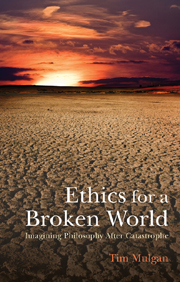Book contents
- Frontmatter
- Contents
- Acknowledgements
- Preface: Imagining a broken world
- Introductory lecture: Philosophy in the age of affluence
- Part I Rights
- Part II Utilitarianism
- Part III The social contract
- Lecture 12 Hobbes and Locke
- Lecture 13 Rawls
- Lecture 14 Rawls and the future
- Lecture 15 Rawls in a broken world
- Part IV Democracy
- Reading list
- Bibliography
- Index
Lecture 15 - Rawls in a broken world
from Part III - The social contract
- Frontmatter
- Contents
- Acknowledgements
- Preface: Imagining a broken world
- Introductory lecture: Philosophy in the age of affluence
- Part I Rights
- Part II Utilitarianism
- Part III The social contract
- Lecture 12 Hobbes and Locke
- Lecture 13 Rawls
- Lecture 14 Rawls and the future
- Lecture 15 Rawls in a broken world
- Part IV Democracy
- Reading list
- Bibliography
- Index
Summary
Rawls explicitly designed his theory of justice for his own society. He did not extend his principles to the unfavourable conditions of a broken world. To use Rawls today, we must extrapolate. And our resources are meagre. Rawls's two great works – A Theory of Justice and Political Liberalism – both survive only in fragments; and virtually all of the (apparently once voluminous) scholarly commentary is now lost. So the task of interpreting Rawls for our broken world leaves much scope for experiment, speculation and disagreement. Today, three graduate students whose dissertations discuss Rawls offer their different perspectives. As ever, I shall anonymize everyone for the transcript. And remember, I have asked them to speculate about what Rawls might have said, so they are not necessarily presenting their own views.
A broken original position
student a: Good afternoon! My thesis develops a Rawlsian original position for our broken world. My starting-point is a great quote I found from one self-described affluent “disciple” of Rawls: “We take for granted that today only a fool would not want to live in such a society”. Astonishingly, he was talking about liberal democracy! (I know: how myopic is that?) But, actually, he was right about Rawls. Rawls never really defended liberal democracy. He built a presumption in favour of democraitc instituions into his original position.
- Type
- Chapter
- Information
- Ethics for a Broken WorldImagining Philosophy after Catastrophe, pp. 185 - 196Publisher: Acumen PublishingPrint publication year: 2011



